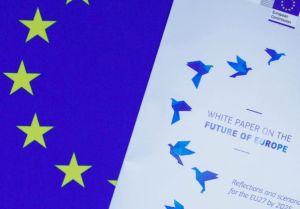Analytics, EU – Baltic States, Legislation, Modern EU
International Internet Magazine. Baltic States news & analytics
Thursday, 25.12.2025, 04:02
Discussing the EU's future: more people involved
 Print version
Print version |
|---|
Commission
President Jean-Claude Juncker
expressed satisfaction that "so many people engaged in the debate about
the EU's future". There have been many different views expressed already
in the member states showing strong positive momentum driving the process
forward.
He reiterated Commission's intention to outline its opinion on the Whate Paper in September after collecting citizen's vision. Real Europe's future will depend on "citizens' design, as they are writing the history books of European tomorrow", he added.
Background
On 1 March
2017, the Commission launched a pan-European debate with the "White Paper
on the Future of Europe", which will enable citizens and leaders to shape
the vision of the EU at 27. The White Paper offers five scenarios for the
Union's evolution by 2025:
=
"Carrying On": the EU-27 continues delivering on its positive reform
agenda;
=
"Nothing but the Single Market": the EU-27 would focus on the single
market as 27 states are not able to find common ground on an increasing number
of policy areas;
=
"Those Who Want More Do More": the EU-27 proceeds as today but
willing states could work closer together in specific areas;
=
"Doing Less More Efficiently": focus on delivering more and faster in
selected policy areas, while doing less in others;
=
"Doing Much More Together": the EU states decide to share more power,
resources and decision-making across the board.
The scenarios cover a range of
possibilities with the outcomes varying depending on the policy area looked at.
They are illustrative in nature and are neither mutually exclusive, nor
exhaustive.
The Commission also presented
a series of reflection papers on key issues for Europe: (1) developing the social
dimension of Europe; (2) deepening the Economic and Monetary Union; (3)
harnessing globalisation; (4) the future of Europe's defence and (5) the future
of EU finances.
President Juncker's State of
the Union speech in September 2017 will take these ideas forward before first
conclusions can be drawn at the December 2017 European Council. This will help
to decide on a course of action to be rolled out in time for the European
Parliament elections in June 2019.
Five scenarios: active debate
The
Commission offered five scenarios for how the EU could develop in the next
decade. A broad debate has since been taking place, supported by political
institutions and by civil society at large.
To date, over 270,000 citizens
have attended over 1,750 events organised or supported by the Commission with
many more participating online. Events and debates will continue to be
organised over the months to come and citizens can also contribute directly,
see the link below: https://ec.europa.eu/commission/give-your-comments_en
Citizens are invited to
continue to express their views, notably prior to the annual State of the
European Union speech on 13 September 2017, when President Juncker will outline his vision for
the future of Europe.
For more
information use the following links: = Factsheet: The debate on the future of Europe; = White paper on the Future
of Europe; = The White Paper process; = The Citizens' Dialogues; =
Eurobarometer surveys on the Future of Europe conducted in October 2016 and in
April 2017; = The European Story: 60 years of shared progress.
Source: http://europa.eu/rapid/press-release_IP-17-2029_en.htm?locale=en








 «The Baltic Course» Is Sold and Stays in Business!
«The Baltic Course» Is Sold and Stays in Business!

